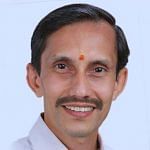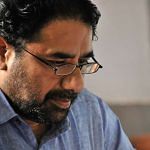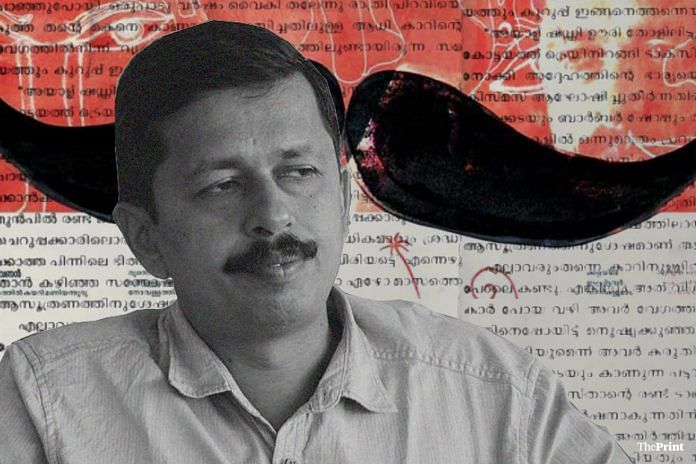Malayalam novelist S. Hareesh was forced to withdraw his novel Meesha (Moustache) last week after he claimed to have received threats to life from radical right-wing outfits.
Facing abuse on social media, Hareesh said that he “was too weak” to take on the powerful. Hareesh’s novel, which was being serialised in Malayalam weekly Mathrubhumi, got mired in controversy over its sexually explicit portrayal of Indian women.
ThePrint asks – Is attack on writers an attempt to stifle freedom of expression or are they being culturally insensitive?
Given the current scenario, authors must experiment with their writing style
 Perumal Murugan
Perumal Murugan
Author
Writers and thinkers in the past have written more controversial articles than what we are seeing today. Traditional Tamil literature has been provocative and yet no one protested back then.
I don’t accept the argument that protests and retaliations are a result of writers crossing their line. Rather, I feel that those who are creating troubles are doing so with a purpose.
I feel the abusive attacks on writers are a result of the way politics is being played today. People’s emotions are being manipulated, and writers have become a target of this vicious trend.
Today’s audience needs to be mature to understand the nuances in writings. Just because one is educated doesn’t mean s/he will understand literature.
A writer, often, cannot take a definitive stand saying that s/he will write what s/he wants because I believe writers are not represented by a huge organisation, and are pretty much on their own, fighting their own battles. If people protest, writers will have to change their writing style.
I think the stand taken by Hareesh is the right. We don’t have a situation today where readers have the maturity to understand or appreciate his work. That’s why he said he will publish the story only when society is ready to accept it.
I believe that if a writer believes in presenting a situation realistically, s/he should experiment with the writing style, given the current circumstances. For instance, one could write a piece in an as-it-happened manner or deal with the same subject through magic realism.
One can use symbolism like Kafka did, and find newer forms to communicate with their readers. Such a process will enhance a writer’s perspective and prospects.
I was told my hands and legs will be chopped off
 K.P. Ramanunni
K.P. Ramanunni
Kerala Sahitya Akademi Award winner and writer
In Kerala, we have a great literary tradition and we are tolerant and inclusive. We allow criticism to thrive, and this kind of resistance against literature is very new and strange for us.
Take the example of a traditional art form called “Chakyar Koothu”, which is performed within the temple premises and wherein a member of the ‘chakyar’ community criticises the temple’s priest. In that rendition, a priest is said to have three roles – to satiate his family’s hunger, to satiate the hunger of women who visit the temple, and to satiate the hunger of god. But, no one has ever raised an objection to this, so why now?
It shows that our writers and storytellers had all the freedom to write as they wished. This is our tradition. In Hareesh’s novel, the comment on temple-going women is made by a character that is drunk, and does not necessarily reflect the author’s ideology.
Any literary work has varied characters. In Ramayana, Ravana is shown as showering abuses at Rama who is a Hindu god. Will you attack Valmiki for creating Ravana?
These people who spread communalism do not represent Hindu dharma, and are instead tarnishing it. It is pure politics to play with people’s emotions.
I was told that my hands and legs will be chopped off after I wrote an article which was nothing but an appeal to Hindus and Muslims to not fight. I had written that the conflict between Hindus and Muslims was created by the British who wanted to divide and rule, and that RSS was trying to inherit that idea.
Hareesh is quite upset and scared, but he should not have backed out. We are trying to convince him to go ahead with his novel.
Temple-going women felt offended with Hareesh’s writings
 M.T. Ramesh
M.T. Ramesh
BJP spokesperson, Kerala
Nobody has threatened Hareesh’s family and no such complaint has been filed. If anyone has indeed threatened him, he should file a complaint against him/her.
Having said that, women who felt offended by Hareesh’s writings are agitating in Kerala. These women, who are temple-goers, felt that Hareesh should not have written what he wrote. They protested in front of temples and burnt copies of the weekly that published his work.
He says in his novel that women who go to temples silently express their consent to a sexual relationship with the temple priest. Women from every political party felt offended and protested, but none threatened him.
Our protest is not against Hareesh but against a popular weekly, which is held in such high regard and published his work.
Hareesh is a novelist and has freedom to express himself, but he has no right to harm anyone else’s sentiment. I think he has crossed his limit.
What is happening today is that when writers express their opinions against some other religion, they withdraw the comments following protests. But when authors/columnists write against Hindu community, they don’t expect us to protest.
Famous artist M.F. Husain portrayed our goddess in a vulgar way, which is neither art, nor culture. A writer/columnist is someone who guides the society, but today their works are fuelling violence and a sense of anti-establishment, thereby creating a rift in society.
If a writer’s family, mother & wife are threatened, what will he do?
 M.A. Baby
M.A. Baby
CPM Politburo member and former Kerala culture minister
It is a question of freedom of expression of artistes and writers, but more than that it is a case of suppressing people. This move only reflects the fascist tendency within the ruling dispensation.
This comes close to the killings of rationalists Govind Pansare, Narendra Dabholkar, M.M. Kalburgi and Gauri Lankesh. People are being attacked in the name of religion, cow, and child-lifting rumours.
Kerala is far more democratic and secular compared to other states, but communal and extremist forces are at work here. Sporadic incidents are taking place, but that does not mean that these forces will have an upper hand.
Hareesh has declared that he is withdrawing his novel, and said that he will put it out when the time is right. Each writer will be compelled to take a view based on the situation at that time. If his family, mother, wife are threatened, what will he do?
But at the same time, another Sahitya Akademi award winner Prabha Varma had challenged those trying to put him down by saying that if anyone takes out a knife to attack me, s/he will be forced to put it back.
Artistes of different genres can have different responses. When Perumal Murugan was threatened, he had refused to attend events. When people expressed their solidarity with him, he came out, and is now back to writing.
So, I hope sooner or later, Hareesh too will come forward and continue writing.
If a writer chooses to withdraw his work, that’s also a mark of protest
 Kannan Sundaram
Kannan Sundaram
Managing Director and Publisher, Kalachuvadu
I don’t believe that writers today are crossing the line. In fact, writers are now very careful, and are not writing as freely as they used to a few decades ago. I don’t think creative writers ever intend to hurt others with their work.
This is not about how much support Hareesh receives from the publisher or the magazine because they cannot shield him from religious fundamentalists.
Like in Perumal Murugan’s case, the threat to life and family is very real. The comments against a writer and his family on social media are as bad as any physical violence. It is not possible to save oneself from such attacks unless the state and central governments take a stern view in this issue. Unfortunately, every government has its own stand.
I think all political parties and religious movements are intolerant in India. There isn’t a single political party that I know of that endorses freedom of expression, or a political leader who will stand up for it.
Group of organisations under the Hindutva bandwagon are pulling people from various sections, including religious figures, and are trying to build an atmosphere of hate and intolerance.
Writers are always a thorn in the flesh for society, but any protest against a writer should be done in a manner that befits a democracy.
Having said all this, I think the stand taken by Hareesh is very sensible and I don’t think a writer should do anything that endangers his or his family’s well-being. We can only hope that this situation doesn’t last long. If a writer chooses to withdraw his work, that is also a form of protest and exposes intolerance. Hareesh chose to do that.LL
Law, lawmakers must ensure fringe elements don’t violate code of humanity & tolerance
 Rohini Swamy
Rohini Swamy
Associate Editor
As I write this piece, I can expect social media trolls to threaten or spite me, but that does not stop me from writing what I feel.
Many writers today, however, think twice before writing, worrying about the kind of backlash they can expect. Will they be threatened, will their family be dragged into it, or will they have to stop writing?
Writers, artistes and journalists are facing a similar situation today. Writers like Hareesh choose to take a step back when their family is threatened, but there are many who stand up to the challenge. Opinions are divided on whether Hareesh’s novel Meesha has hurt the feelings of women.
Having said that, while everybody has a right to express their opinion, threatening someone is no way to protest. Writers have been threatened, some even killed, for expressing their views. That is not the kind of society we grew up in.
We were taught to respect an opinion different from ours even if we don’t agree with it. The law and the lawmakers must ensure that fringe elements don’t violate the code of humanity and tolerance.
There may be many Hareeshs, Perumal Murugans, Taslima Nasreens, or Gauri Lankeshs, and it is our responsibility to protect their voices.
Compiled by Rohini Swamy, Associate Editor at ThePrint.



